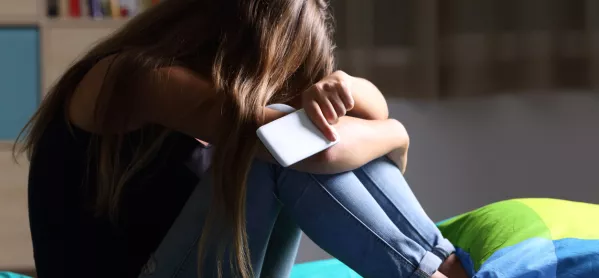‘Rape culture’ teacher advice hotline launched

A government-backed hotline advising teachers on how to deal with sexual abuse among young people has been launched in response to last year’s Ofsted review into “rape culture”.
The Harmful Sexual Behaviour Support Service provides advice to education and safeguarding professionals, from early years provision to further education as well as the police, social workers and health practitioners, across the country who encounter harmful or abusive behaviour among young people they work with.
The service, funded by the Home Office and Department for Education, was launched after the government review into sexual abuse in schools in March last year amid “rape culture” concerns, after thousands of allegations of peer-to-peer sex abuse were received by the Everyone’s Invited website, many of them involving students who attend private schools.
Ofsted was asked to investigate safeguarding policies in both state and independent schools, to assess the “extent and the severity of the issue” and ensure that processes are in place to “allow pupils to report concerns freely, knowing these will be taken seriously and dealt with swiftly and appropriately”.
The hotline, run by South West Grid for Learning (SWGfL) and the Marie Collins Foundation (MCF), has trained safeguarding and law enforcement specialists to advise on incidents, provide guidance on policy development and share best practice on tackling harmful sexual behaviour.
- 2021: Government launches review into school sexual abuse
- Exclusive: Half of teachers need more help on pupil sexual conduct
- Amanda Spielman: Naked images can be safeguarding issue
The 2021 Ofsted review spoke to over 900 children and young people, as well as school leaders, teachers, governors, local safeguarding partnerships and parents, and revealed widespread peer on peer sexual harassment. It was reported some incidents were “so commonplace that they see no point in reporting them” and “consider them normal”.
Over two-thirds of girls and over a quarter of boys interviewed by the watchdog said that they felt pressured into sexual activity they were uncomfortable with, and nearly 90 per cent of the girls and 50 per cent of the boys reported that they had been sent unwanted explicit pictures or videos.
Most girls - 80 per cent - and over half of boys said they have received unwanted or inappropriate sexual comments.
Rachel Maclean, safeguarding minister, said: “This new service will ensure expert-led advice and guidance is easily accessible and the response to harmful sexual behaviour will be significantly strengthened.”
Ms Maclean said sexual abuse can have a “devastating impact” on school pupils and said she is committed to ensuring professionals working with young people have the support they need through the Tackling Child Sexual Abuse Strategy.
The NSPCC also launched a hotline last year providing support and advice to victims of sexual abuse in schools, including both children and adults.
Baroness Diana Barran, minister for the school system, said sexual harassment between young people has become “far too commonplace” and recognised some school staff “lack confidence” in knowing how to respond.
“That’s why we have strengthened support for schools and colleges to help them respond appropriately and create healthy environments for young people,” she said.
“Relationships, sex and health education is also about teaching important topics such as consent and respect, and the NSPCC’s Report Abuse in Education helpline provides vital advice to individuals who have been a victim of sexual abuse.”
Carmel Glassbrook, lead for harmful sexual behaviour support at SWGfL, said a “widespread cultural shift” is required to revert the normalisation of sexual harassment.
“We know that the majority of the children’s workforce is under-equipped to address the growing issue and help the young people affected,” she said. “So this service is there to provide them with vital professional guidance and tools they need.”
Lawrence Jordan, professional lead of the MCF, said: “It is essential that children can learn and develop in an environment where they feel safe.
“As the scale of this problem is now recognised, it is vital that those on the front line have as much support as possible to enable them to respond appropriately.”
The Harmful Sexual Behaviour Support Service, developed in collaboration with the DfE, is available Monday to Friday 8am to 8pm on 0344 225 0623 or hsbsupport@swgfl.org.uk.
You need a Tes subscription to read this article
Subscribe now to read this article and get other subscriber-only content:
- Unlimited access to all Tes magazine content
- Exclusive subscriber-only stories
- Award-winning email newsletters
Already a subscriber? Log in
You need a subscription to read this article
Subscribe now to read this article and get other subscriber-only content, including:
- Unlimited access to all Tes magazine content
- Exclusive subscriber-only stories
- Award-winning email newsletters
topics in this article



